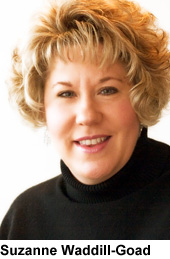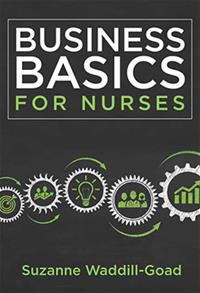Starting a business? Don’t do it all yourself.
 The author of Business Basics for Nurses, published by Sigma, responds to questions from the editor of Reflections on Nursing Leadership.
The author of Business Basics for Nurses, published by Sigma, responds to questions from the editor of Reflections on Nursing Leadership.
RNL:
As the author of Business Basics for Nurses, what are two or three things you especially want readers to know or better understand after reading your book, and why do you feel those items are so important?
 Suzanne “Suzi” Waddill-Goad:
Suzanne “Suzi” Waddill-Goad:
Most nurses are not inclined to consider the business aspects of healthcare that, ultimately, may affect their role as caregiver. As the author of Business Basics for Nurses, I wanted to convey important business concepts related to healthcare in a manner that any nurse could understand. With nearly 3 million nurses in the United States alone, these concepts apply to every nursing role, and some are also pertinent to personal finance, research, and the law.
In any setting, the infrastructure for nursing care is monumental, with many people responsible for tasks such as adhering to regulatory requirements, receiving goods and services via supply chain mechanisms, meeting contractual requirements, managing real estate, implementing normal business and financial functions, and so on. Learning the ins and outs of how things really work on the business side of healthcare will propel any nurse forward in his or her career.
RNL:
Writing a book takes a lot of time and effort. Why did you feel compelled to write Business Basics for Nurses? What work experiences were especially helpful in preparing you for the task?
Waddill-Goad:
I had authored a previous Sigma book, Nursing Burnout: Overcoming Stress in Nursing, which helped. I was also motivated by my Master of Business Administration (MBA) and Doctor of Nursing Practice (DNP) degrees, both of which focused on managerial and executive leadership. In addition, my work experience, which has been solely in the healthcare industry—25 years as an employee and 15 years self-employed—provided unique qualifications. I really wanted to share what I had learned on my nursing journey as a clinical nurse, nurse leader, and consultant. In doing so, I was hopeful that the information I provided would help others.
RNL:
Much of your business-related experience as a nurse was in the hospital setting. After becoming a registered nurse and then moving up the ladder to become a chief nursing officer, operations improvement coordinator, and director of quality improvement, what business training or experience best prepared you to take on those assignments?
Waddill-Goad:
There is no substitute for learning on the job and building relationships! While academic preparation can teach concepts, one must be able to put new knowledge into practice. Being aware of opportunities in the workplace and having an advocate or mentor(s) are critical. Willingness to take risks and move into new roles or areas in which one hasn’t had previous experience is also crucial to growth and development.
My MBA and DNP degrees, combined with a variety of differing employment experiences, gave me the confidence to step out on my own in 2003. Consulting has been a wonderful growth experience, and I learn as much from my clients as they do from me.
RNL:
What advice would you give nurse practitioners who contemplate starting their own business?
Waddill-Goad:
I would give nurse practitioners looking to take the plunge into running their own business two pieces of advice: 1) Read Chapter 6 of this book. It was written by two successful, doctorally prepared nurse practitioners who did just that. They launched private practices, one in anesthetics, the other in general and occupational medicine. 2) Find a good mentor or coach who can assist and advise when beginning the business journey. It takes initiative, patience, and grit—as well as a village! It helps to know ahead of time that your entrepreneurial journey will be fraught with unpredictable situations, interesting challenges, and difficult days, and it’s reassuring to know that help is only a phone call, email, or text away.
RNL:
From your discussions with nurses who have started their own business, what are they likely to say if asked, “If you had it to do over again, what would you do differently?”
Waddill-Goad:
Nurses I know who are in business would overwhelmingly say: Get help when you need it. Don’t try to do everything yourself. It truly takes a team to run any successful business, even when you are a solo practitioner. There are many tasks in which you may not be an expert—bookkeeping, accounting, legal, marketing, information technology, web design, social media, etc.—and must outsource the work to others.
They would also say: Pace yourself. This is a marathon, not a sprint. If you don’t take care of yourself, you will not be any good to others! It is important to stay healthy by eating right, taking breaks, getting enough sleep, building regular exercise into your daily routine, and taking time to refresh with rest and relaxation. RNL
 Suzanne M. Waddill-Goad, DNP, MBA, RN, CEN, author of Business Basics for Nurses and Nurse Burnout: Overcoming Stress in Nursing, both published by Sigma, is president and principal consultant of Suzanne M. Waddill-Goad & Company Inc., a consulting practice specializing in operational improvement and leadership development. In more than 35 years of healthcare-related experience, she has performed many roles, including operations improvement coordinator and chief nursing officer.
Suzanne M. Waddill-Goad, DNP, MBA, RN, CEN, author of Business Basics for Nurses and Nurse Burnout: Overcoming Stress in Nursing, both published by Sigma, is president and principal consultant of Suzanne M. Waddill-Goad & Company Inc., a consulting practice specializing in operational improvement and leadership development. In more than 35 years of healthcare-related experience, she has performed many roles, including operations improvement coordinator and chief nursing officer.